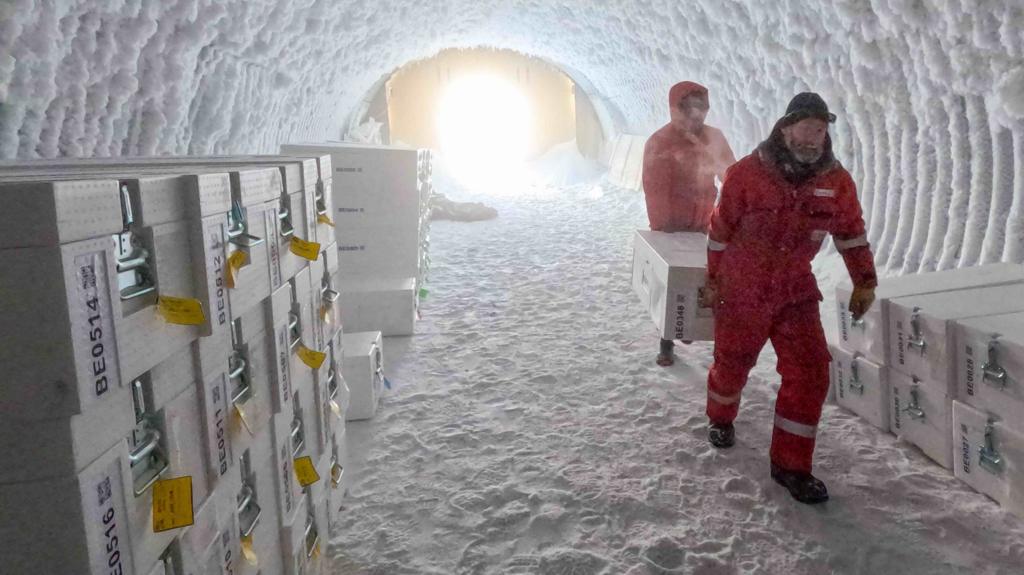“`html
A potentially 1.5-million-year-old ice core has arrived in the UK, where scientists are preparing to melt it and extract critical data about Earth’s past climate.
This glassy cylinder, the planet’s oldest ice sample, was carefully extracted from deep within the Antarctic ice sheet.
Encased within is millennia of previously unknown information that researchers believe could “revolutionize” our understanding of climate change.
BBC News gained access to the -23C freezer room at the British Antarctic Survey in Cambridge to view the invaluable ice samples.
“This represents a completely unexplored era in our planet’s history,” stated Dr. Liz Thomas, head of ice core research at the British Antarctic Survey.
Red warning lights flashed above the door to the freezer room, which also featured an emergency escape hatch leading to an underground tunnel in case of unforeseen circumstances.
Strict protocols limited visits to 15 minutes at a time, with personnel required to wear insulated overalls, boots, hats, and gloves.
The extreme cold caused a camera’s electronic shutter to freeze and hair to become brittle and icy.
Dr. Thomas showcased the oldest cores, potentially dating back 1.5 million years, on a worktop beside stacked boxes of ice. The cores were remarkably clear, allowing a view through them.
Over a seven-week period, the team will meticulously melt the ice, releasing ancient dust, volcanic ash, and microscopic marine algae called diatoms trapped since the water froze.
Analysis of these materials will provide insights into wind patterns, temperatures, and sea levels from over a million years ago.
The meltwater will be channeled into specialized equipment in a nearby lab, one of the few facilities globally capable of conducting this type of analysis.
The ice core extraction in Antarctica was a large-scale international endeavor costing millions of dollars. The ice was divided into 1-meter sections and transported by ship and refrigerated truck to Cambridge.
Engineer James Veale assisted in extracting the ice near the Concordia research station in East Antarctica.
“Holding those sections in my gloved hands, taking great care not to drop them, was an incredible feeling,” he recounted.
Research institutions in Germany and Switzerland also received sections of the 2.8km core.
Dr. Thomas noted that the teams may uncover evidence of a period exceeding 800,000 years ago when carbon dioxide levels were naturally as high, or even higher, than current levels.
This could provide valuable context for understanding the planet’s response to elevated greenhouse gas concentrations in the future.
“Our climate system has undergone numerous changes, necessitating a look back in time to comprehend different processes and potential tipping points,” she explained.
A key difference between the past and present is the rapid increase in greenhouse gases caused by human activity over the past 150 years.
This is leading the planet into uncharted territory, but scientists hope that the environmental history preserved in the ice will offer crucial guidance.
The team will analyze chemical isotopes in the meltwater to reconstruct wind patterns, temperatures, and rainfall from a period between 800,000 and possibly 1.5 million years ago.
An inductively coupled plasma mass spectrometer (ICPMS) will be used to measure over 20 elements and trace metals.
This includes rare earth elements, sea salts, marine elements, and indicators of past volcanic eruptions.
This research will help scientists investigate the Mid-Pleistocene Transition, a mysterious shift that occurred 800,000 to 1.2 million years ago when the planet’s glacial cycles changed abruptly.
Before this transition, warmer and colder periods alternated roughly every 41,000 years. Afterward, the cycle shifted to every 100,000 years.
Dr. Thomas identified the cause of this transition as one of the “most exciting unsolved questions” in climate science.
The ice cores may contain evidence of periods with significantly higher sea levels and smaller Antarctic ice sheets.
Analyzing dust particles within the ice will aid in understanding how ice sheets shrank and contributed to sea-level rise, a pressing concern in the current century.
Council accused of “political ideology” after halting climate targets citing costs.
Government provides update on the Isle of Man’s climate change plan.
Before air-conditioning, Dubai’s old town used clever techniques to keep homes cool.
The hidden legacy of the first nuclear weapon test can still be found in our cells.
Water company monitoring the weather, but recent rain “delayed the need for restriction”.
“`

